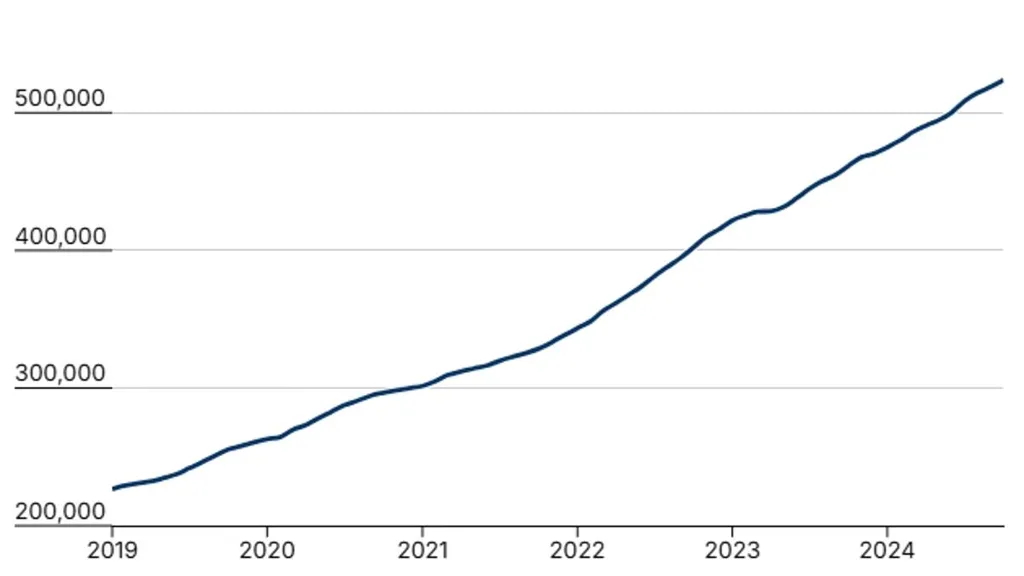By RORY TINGLE, HOME AFFAIRS CORRESPONDENT and OLIVER PRICE, DATA JOURNALIST FOR MAILONLINE
Half a million adults are now claiming disability benefits for anxiety and depression - a new record.
The number of Personal Independent Payment (PIP) claims related to anxiety or depressive disorders hit almost 525,000 in October - a rise of 14 per cent from 461,000 a year ago.
This figure has doubled since Covid, according to data published yesterday by the Department for Work and Pensions (DWP) that will add to concerns about Britain's ballooning welfare bill.
Psychiatric disorders now make up 39 per cent of claims, while musculoskeletal issues, including pain, account for a further third of total claims.
The statistics reveal that the group most likely to claim for anxiety or depression are people in their 50s, followed by those in their 30s.
The figures follow Sir Keir Starmer pledge last month to 'crack down hard' on the 'bulging benefits bill blighting our society'.
Under the PIP scheme, recipients in need of help due to illness, disability or mental health problems can get up to £172 per week.
There are now 3.6million people entitled to the benefit overall, a rise of 3% on the last quarter and a new record.
The system was introduced in April 2013 and is intended to help people living with long-term illness, disability or mental health conditions to live a more independent life by covering extra costs that their ailment incurs.
The Government says people may qualify for PIP mobility payments if they 'have difficulty getting around because of a cognitive or mental health condition, like anxiety'.
This may include those who struggle to leave their home.
Forecasts from the Department for Work and Pensions also shows the total cost of PIP spending is set to soar to £32.8billion by 2028/29.
In 2022/23, a sum of £18.7billion was logged. The number of people receiving the disability benefit is also forecast to rise to 4.7million.
Office for National Statistics estimates last year showed the impact of Britain's cost of living crisis was keeping rates of depression at much higher levels than before the Covid pandemic.
In August, charity Citizens Advice also revealed more than 430,000 people were awaiting a PIP review, with some facing delays of more than two years.
Officials believe that the rise in benefits for anxiety and depression are driven by an older and sicker population, as well as by greater awareness of mental health problems and a cost of living crisis that is driving more people to claim support.
Sir Keir has promised 'sweeping changes' to the £137bn bill for non-pensioner benefits, vowing: 'No more business as usual.'
Officials forecast that four million people will be claiming long-term sickness benefits by 2030 - 60 per cent higher than before the pandemic.
Much of the rise is due to an increase in benefits paid out for mental health-related conditions, which account for more than a third of all disability claims: the amount spent by taxpayers on Attention Deficit Hyperactivity Disorder (ADHD) claims alone has shot up from just £700,000 per year in 2013 to an astonishing £292million today, a rise of more than 41,000 per cent.
His White Paper is expected to include the placement of work coaches in mental health clinics and the revamping of job centres.
The NHS could also provide direct employment for tens of thousands of people who are economically inactive for health reasons, including filling more of its non-clinical roles with people who are currently classified as economically inactive.
A Government spokesman said: 'We've inherited a spiralling benefits bill and have been clear that the current system needs reforming.
'We're already taking action with our Get Britain Working White Paper - by joining up local work, health and skills plans to support people into employment - and will set out plans to reform the health and disability benefits system in the spring, so that it delivers for disabled people and the taxpayer.'
